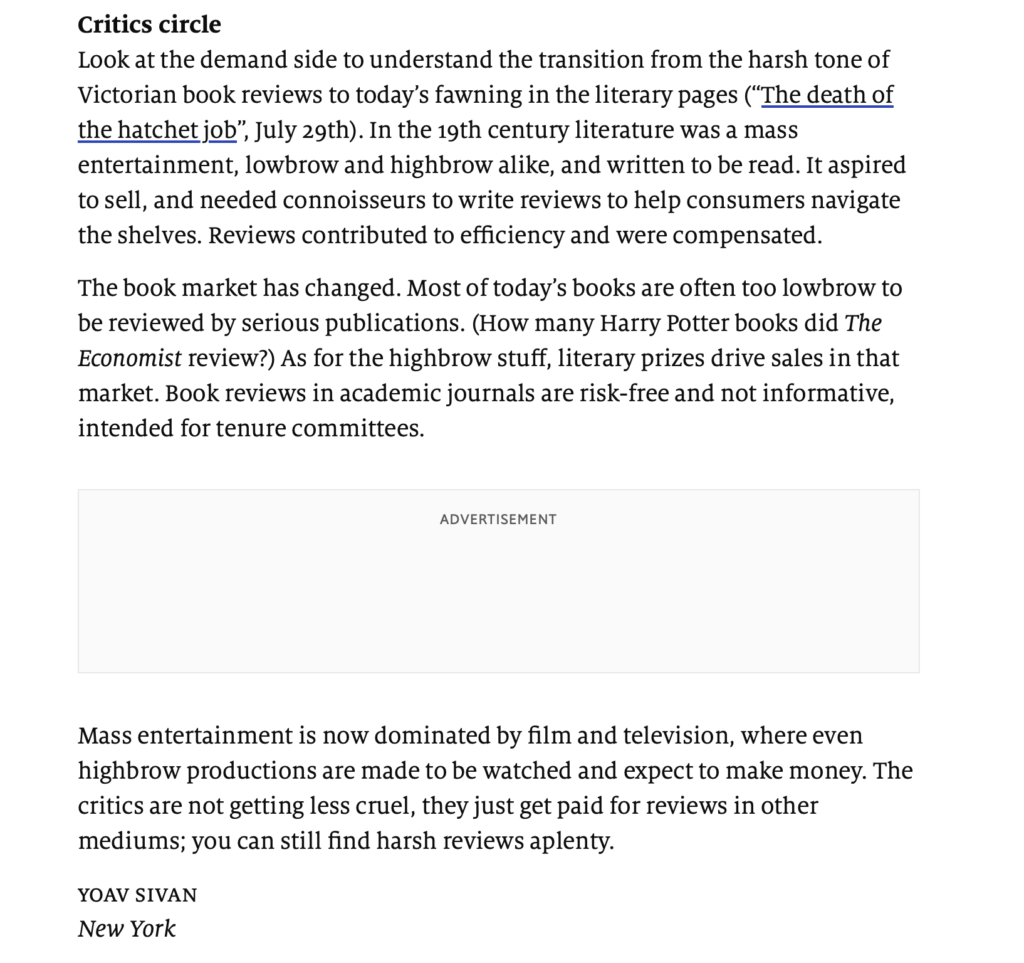Culture: Demand-side vs supply-side analysis
A recent piece in The Economist has prompted me to articulate my thoughts on the dynamics of culture; my letter is below. The Economist lamented the grade inflation in book reviews today, compared with a prewar golden age of sharper pens of reviewers gleefully opinionated on the record. Today, says the newspaper, book reviews are quite vanilla.
My letter suggests a general argument about supply- vs demand-driven culture and how the nature of reviews may help distinguish between the two.

It is probably straightforward enough to put the argument to a rigorous empirical test. A few additional thoughts.
In a recent article The Economist covered the two recent Hollywood blockbusters “Barbie” and “Oppenheimer,” exhibiting no qualms moving from one film to the other in the same piece.
The Economist and Harry Potter
As far as I can tell The newspaper did not review any of the seven books in the immensely popular series. But Harry Potter has become a global phenomenon and an available reference, which The Economist readily acknowledged and made use of. It reported (not reviewed) on the movies.
A long Christmas Special in 2009, focusing on the sophisticated business to emerge, opined in passing:
It is not great literature. The first three books make for pleasant and occasionally gripping beach reading. From the fourth instalment the series begins to sprawl. It also makes unconvincing forays into teenage psychology. Yet even at their clumsiest the books are well-plotted and full of invention. They also avoid the temptation to sneak ideology into children’s heads by wrapping it in fantasy. C.S. Lewis’s children’s books, to which Ms Rowling’s are often compared, are spoiled by creeping piety. Philip Pullman’s suffer from strident anticlericalism. Although the Harry Potter series endorses traits such as bravery and loyalty, it is intended above all to entertain. It has, hundreds of millions of times.
In 2012, The Economist reviewed J.K. Rawling first non-Harry Potter book.
A few years later, in 2016, The Economist covered a theater production of Harry Potter.
My opinion on Harry Potter
I read up to number 4, which tells you that I found it valuable enough. I reread the first one recently and thought it was well, sometimes very well, written, and quite clever.
One thing bothered me— the underlying concept of aristocracy. This is a very British book. An American writer wouldn’t have had Harry as a prince in search of a kingdom. Of course the concept of aristocracy here is highly modern, but it is still incredibly pervasive through the book to make me uncomfortable. Though, I admit, the expectations of greatness (including great travails and great failures) help for great drama (Sophocles, Shakespeare).